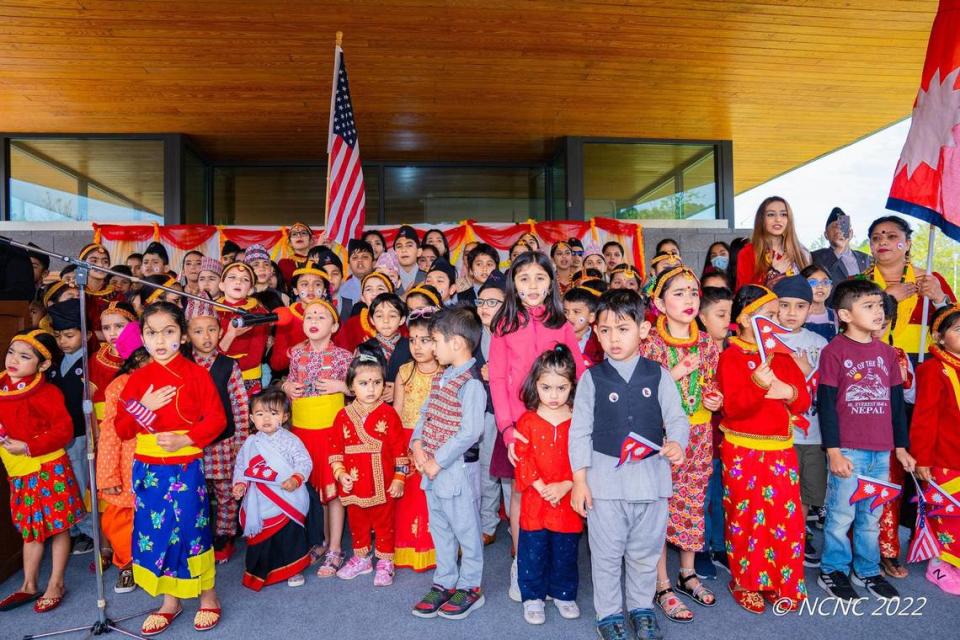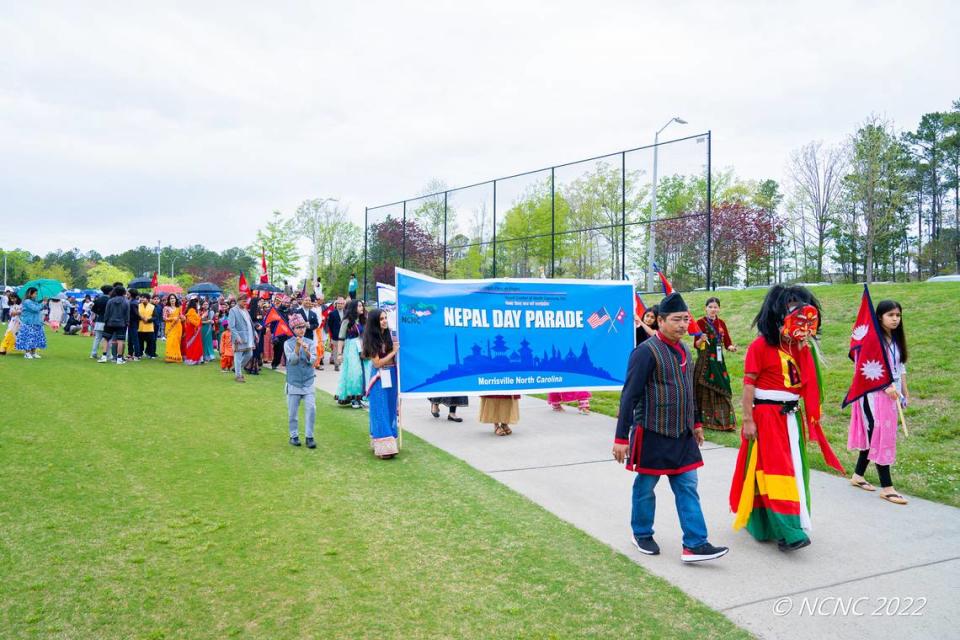‘A little bit of home’: Nepali people in Wake County ring in new year with Nepal Day
Momo is a stuffed dumpling with vegetables or meat that is dipped in a spicy tomato sauce called achaar made with chili, peppercorns and garlic.
To make them, a small piece of dough is made into a wrapper, stuffed with the filling, pinched around the edges to form a little satchel, and steamed to perfection.
The flavorful dish is native to Nepal, a small, landlocked country between India and China. This Saturday, momos can be found at one of the many Nepali food vendors at Morrisville’s Church Street Park to celebrate Nepal Day. The day coincides with the Nepali New Year, which just celebrated the year 2081 on April 13, due to their calendar being 57 years ahead of the Georgian calendar.
“This (event) is a little bit of home, even though we are far away from home,” said Kalpana Bhandari, the executive secretary of the Nepal Center of North Carolina.
About 6,000 Nepali families live in Wake County, mostly in Morrisville, Cary, Apex and Holly Springs. Because they are smaller in number and share similarities with the large Indian community, Nepali people are often mistaken for Indian.
“When you say you’re from Nepal, some people think you’re from India,” Bhandari said. “We’re close to India, but we’re different. It’s important for us to be recognized and to show a different part of the world. Nepal Day is a proud moment for us.”
A fusion of geography and culture
Mostly located in the Himalayas, more than 10 of the highest peaks in the world are found in Nepal, with Mount Everest being the tallest. Many people know of the country because of the mountains and the Sherpa people, an ethnic group known for their climbing skills and culture.
But Bhandari said there is more to learn about Nepal, home to over 30 million people and is about the size of Arkansas. Immigrants from the country who move here have opened businesses and actively participate in local politics, the school system, and the community.
“Nepal has its own language, with hundreds of ethnic groups who have their own languages,” Bhandari said. “They have their own food and culture and their own customs.”
Nepal is also the birthplace of Buddha, and many people, like the ethnic group Newar, practice Tibetan Buddhism. Hinduism is the dominant religion, and Nepalese and English are the dominant languages.
“Nepal is a fusion of multiple geographic features and multiple cultures,” said Bikash Shakya, the president of the Nepal Center of North Carolina. “We have the Himalayas region, the plain land, where Kathmandu, the capital, lies, and the middle area.”

Bhandari said many Nepalese immigrants are attracted to the Triangle area because of its proximity to Research Triangle Park, the local school system, nearby universities, and the weather patterns similar to some areas of Nepal.
“And it’s not the case now but the housing here was affordable before the COVID-19 pandemic,” Bhandari said. “There was a lot of movement here before them.”
Shakya, a Holly Springs native of Newar descent, said Nepal Day attracts Nepali people from all around the state, including the Triad and Charlotte, to Morrisville for the celebration, which also serves as an opportunity for other attendees to learn about the culture.
“We display ethnic dresses, ornaments, foods, and since it’s open to the public and in a public park, people here come to visit and see Nepali dances and culture and taste the food,” Shakya said. This is the biggest event hosted by the Nepal Center of North Carolina.
The center, also called NCNC, has over 2,000 members and has been crucial in building community ties and supporting Nepali residents. The organization hosts blood drives and fundraisers for local issues and families in Nepal and helped get dozens of Triangle residents vaccinated against COVID-19.

A fun family atmosphere
Western Wake County has seen the largest influx of Indian, southwest, and south Asian residents in recent years. Morrisville has the greatest number of Asian residents at 46% and about 400 Nepalese families live in the town.
Mayor TJ Cawley, who served as a town councilman in 2017, said the town needed to designate the day because it is “important to our value of inclusiveness.”
“We’re always happy to do what we can to celebrate culture,” he said. “It’s makes us a tapestry. What makes Morrisville a great place to live is not just our location but also our residents and staff.”
Cawley said he looks forward to the Nepal Day celebrations and the children’s performances. As a performer himself alongside Indian residents at Diwali each fall, he said he’s proud to see kids face their fears and perform in front of dozens of people.
“(Nepal Day) is always something I’ve enjoyed. I love meeting people and walking in the parade. This is always a great fun, family atmosphere,” Cawley said.
Nepal Day will begin on Saturday with a blood drive at 7 a.m. at Church Street Park, 5817 Cricket Pitch Way, Morrisville.
The parade begins around the cricket field at 11 a.m., and festivities will continue until 5 p.m.
The celebration includes local Nepali food vendors selling ethnic dishes and native yogurts and bread, face painting, bounce houses, Nepali bands and singers, and local business owners.
“If you want to know about Nepal, the Nepali people, their culture, dresses, and music, this is the right place and the right time to come,” Shakya said. You’d be amazed.”

